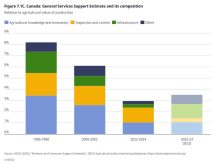Eight former farmer-elected Canadian Wheat Board directors are appealing Manitoba Court of Queen’s Bench Justice Shane Perlmutter’s Feb. 24 decision not to protect the board’s single desk while the courts determine the legality of a federal law killing it.
Agriculture Minister Gerry Ritz is asking why the directors don’t “move on,” but the directors contend Canadian democracy is ultimately at stake.
“We would move on when the government starts following the law,” Stewart Wells, a former director who farms near Swift Current, said in an interview April 4. “We don’t ever intend to let a government steamroll over farmers, breaking the law while they do it. Either we have a functioning democracy in this country or we have what they did with the wheat board bill.”
Read Also

Ship’s turning for gene-edited crops
More and more countries have decided that gene-edited crops will be treated the same as conventional plant breeding.
Wells said the directors are dipping into their own bank accounts but they have the moral and financial support of a growing number of farmers. Wells wouldn’t say how many farmers have contributed money for the court cases but he said: “It’s quite inspiring to see how large this group is.
“Farmers are understanding that they don’t have to settle and they can fight for their rights instead. It’s quite inspiring…”
Federal Court Justice Douglas Campbell ruled Dec. 7 that Ritz broke the wheat board act by introducing into Parliament Bill C-18, the Marketing Freedom Act for Grain Farmers. The bill, which became law Dec. 15, creates an open market Aug. 1.
In a written decision Justice Campbell said under Section 47.1 Ritz had a statutory duty to first consult with the wheat board’s board of directors and get farmers’ approval for the change through a plebiscite. The federal government is appealing the ruling.
Justice Perlmutter ruled he wasn’t bound by Campbell’s decision. He also dismissed the notion that 47.1 required the government to get farmers’ approval to change the board’s mandate.
In addition to the Court of Queen’s Bench appeal and the Federal Court appeal, the directors are involved in the Friends of the Canadian Wheat Board’s $17-billion class-action suit against Ottawa. The plaintiffs want the single desk restored or $17 billion in compensation for approximately 70,000 grain farmers in Western Canada.
In the meantime, the post-monopoly wheat board will be “skimming off money from farmers” to build an empire in hopes of creating value to be converted to shares and sold off, Wells said. He fears the board will go the way of Viterra — a combination of the former farmer-owned Prairie Pools and United Grain Growers.
“The people who destroy these organizations jam their pockets full of shares and stock options on the way out and cash them in,” Wells said. “So the people who build the organizations get nothing and the people who destroy them try to line their pockets on the way out. And I don’t want to see that happen again.”















